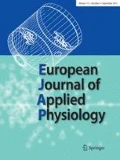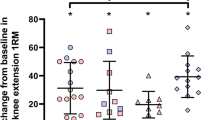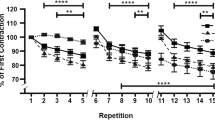Abstract
A single bout of high-force exercise has been shown to increase the muscle levels of heat shock proteins (HSPs). Here, changes in the levels of HSPs after 2 and 11 weeks of strength training with either one or three sets per exercise were examined. Fifteen young men (27 ± 6 years, 182 ± 8 cm and 82 ± 13 kg) were randomized to train either one set in lower-body exercises and three sets in upper-body exercises (1L-3UB), or three sets in lower-body exercises and one set in upper-body exercises (3L-1UB). Biopsies from vastus lateralis and trapezius were obtained before, during (2 weeks) and after 11 weeks of strength training (3 bouts per week). The biopsies were analysed for HSP27 (cytosolic and cytoskeletal fractions) and HSP70 and αB-crystallin (cytosolic fraction). No evidence for an effect of training volume (1 vs. 3 sets) on the HSP response was found. For all subjects combined, HSP27 [186 ± 69% (mean ± SD)], HSP70 (146 ± 51%) and αB-crystallin (184 ± 82%) increased in the cytosolic fraction of vastus lateralis after 11 weeks of training. In the trapezius, the only observed increase was for HSP27 in the cytosolic fraction after 2 weeks of training (149 ± 59%). However, the trapezius contained somewhat higher levels of HSP70 and αB-crystallin than vastus lateralis at baseline. The HSP27 levels in the cytoskeletal compartment did not increase significantly in either muscle. In conclusion, strength training resulted—independent of training volume—in elevated levels of HSP27, HSP70 and αB-crystallin in the cytosolic compartment of the vastus lateralis. In the trapezius, only the cytosolic HSP27 levels were increased with training.



Similar content being viewed by others
References
Abe T, DeHoyos DV, Pollock ML, Garzarella L (2000) Time course for strength and muscle thickness changes following upper and lower body resistance training in men and women. Eur J Appl Physiol 81:174–180
Atomi Y, Toro K, Masuda T, Hatta H (2000) Fiber-type-specific alphaB-crystallin distribution and its shifts with T(3) and PTU treatments in rat hindlimb muscles. J Appl Physiol 88:1355–1364
Bombardier E, Vigna C, Iqbal S, Tiidus PM, Tupling AR (2009) Effects of ovarian sex hormones and downhill running on fiber-type-specific HSP70 expression in rat soleus. J Appl Physiol 106:2009–2015
Feasson L, Stockholm D, Freyssenet D, Richard I, Duguez S, Beckmann JS, Denis C (2002) Molecular adaptations of neuromuscular disease-associated proteins in response to eccentric exercise in human skeletal muscle. J Physiol 543:297–306
Febbraio MA, Koukoulas I (2000) HSP72 gene expression progressively increases in human skeletal muscle during prolonged, exhaustive exercise. J Appl Physiol 89:1055–1060
Febbraio MA, Steensberg A, Walsh R, Koukoulas I, Van Hall G, Saltin B, Pedersen BK (2002) Reduced glycogen availability is associated with an elevation in HSP72 in contracting human skeletal muscle. J Physiol 538:911–917
Fischer CP, Hiscock NJ, Basu S, Vessby B, Kallner A, Sjoberg LB, Febbraio MA, Pedersen BK (2006) Vitamin E isoform-specific inhibition of the exercise-induced heat shock protein 72 expression in humans. J Appl Physiol 100:1679–1687
Folkesson M, Mackey AL, Holm L, Kjaer M, Paulsen G, Raastad T, Henriksson J, Kadi F (2008) Immunohistochemical changes in the expression of HSP27 in exercised human vastus lateralis muscle. Acta Physiol (Oxf) 194:215–222
Frier BC, Locke M (2007) Heat stress inhibits skeletal muscle hypertrophy. Cell Stress Chaperones 12:132–141
Gjøvaag TF, Dahl HA (2006) Effect of training and detraining on the expression of heat shock proteins in m. triceps brachii of untrained males and females. Eur J Appl Physiol 98:310–322
Gjøvaag TF, Vikne H, Dahl HA (2006) Effect of concentric or eccentric weight training on the expression of heat shock proteins in m. biceps brachii of very well trained males. Eur J Appl Physiol 96:355–362
Golenhofen N, Perng MD, Quinlan RA, Drenckhahn D (2004) Comparison of the small heat shock proteins alphaB-crystallin, MKBP, HSP25, HSP20, and cvHSP in heart and skeletal muscle. Histochem Cell Biol 122:415–425
Huey KA (2006) Regulation of HSP25 expression and phosphorylation in functionally overloaded rat plantaris and soleus muscles. J Appl Physiol 100:451–456
Huey KA, Meador BM (2008) Contribution of IL-6 to the Hsp72, Hsp25, and {alpha}{beta}-crystallin responses to inflammation and exercise training in mouse skeletal and cardiac muscle. J Appl Physiol 105:1830–1836
Jamurtas AZ, Theocharis V, Tofas T, Tsiokanos A, Yfanti C, Paschalis V, Koutedakis Y, Nosaka K (2005) Comparison between leg and arm eccentric exercises of the same relative intensity on indices of muscle damage. Eur J Appl Physiol 95:179–185
Judge LW, Burke JR (2010) The effect of recovery time on strength performance following a high-intensity bench press workout in males and females. Int J Sports Physiol Perform 5:184–196
Kadi F, Eriksson A, Holmner S, Butler-Browne GS, Thornell LE (1999) Cellular adaptation of the trapezius muscle in strength-trained athletes. Histochem Cell Biol 111:189–195
Kawano F, Matsuoka Y, Oke Y, Higo Y, Terada M, Wang XD, Nakai N, Fukuda H, Imajoh-Ohmi S, Ohira Y (2007) Role(s) of nucleoli and phosphorylation of ribosomal protein S6 and/or HSP27 in the regulation of muscle mass. Am J Physiol Cell Physiol 293:C35–C44
Khassaf M, Child RB, McArdle A, Brodie DA, Esanu C, Jackson MJ (2001) Time course of responses of human skeletal muscle to oxidative stress induced by nondamaging exercise. J Appl Physiol 90:1031–1035
Koh TJ (2002) Do small heat shock proteins protect skeletal muscle from injury? Exerc Sport Sci Rev 30:117–121
Koh TJ, Escobedo J (2004) Cytoskeletal disruption and small heat shock protein translocation immediately after lengthening contractions. Am J Physiol Cell Physiol 286:C713–C722
Liu Y, Mayr S, Opitz-Gress A, Zeller C, Lormes W, Baur S, Lehmann M, Steinacker JM (1999) Human skeletal muscle HSP70 response to training in highly trained rowers. J Appl Physiol 86:101–104
Liu Y, Lormes W, Baur C, Opitz-Gress A, Altenburg D, Lehmann M, Steinacker JM (2000) Human skeletal muscle HSP70 response to physical training depends on exercise intensity. Int J Sports Med 21:351–355
Liu Y, Lormes W, Wang L, Reissnecker S, Steinacker JM (2004) Different skeletal muscle HSP70 responses to high-intensity strength training and low-intensity endurance training. Eur J Appl Physiol 91:330–335
Liu Y, Gampert L, Nething K, Steinacker JM (2006) Response and function of skeletal muscle heat shock protein 70. Front Biosci 11:2802–2827
Locke M (1997) The cellular stress response to exercise: role of stress proteins. Exerc Sport Sci Rev 25:105–136
Locke M, Noble EG, Atkinson BG (1991) Inducible isoform of HSP70 is constitutively expressed in a muscle fiber type specific pattern. Am J Physiol 261:C774–C779
McHugh MP (2003) Recent advances in the understanding of the repeated bout effect: the protective effect against muscle damage from a single bout of eccentric exercise. Scand J Med Sci Sports 13:88–97
Miller BF (2007) Human muscle protein synthesis after physical activity and feeding. Exerc Sport Sci Rev 35:50–55
Morton JP, MacLaren DP, Cable NT, Bongers T, Griffiths RD, Campbell IT, Evans L, Kayani A, McArdle A, Drust B (2006) Time course and differential responses of the major heat shock protein families in human skeletal muscle following acute nondamaging treadmill exercise. J Appl Physiol 101:176–182
Morton JP, MacLaren DP, Cable NT, Campbell IT, Evans L, Kayani AC, McArdle A, Drust B (2008) Trained men display increased basal heat shock protein content of skeletal muscle. Med Sci Sports Exerc 40:1255–1262
Morton JP, Holloway K, Woods P, Cable NT, Burniston J, Evans L, Kayani AC, McArdle A (2009a) Exercise training-induced gender-specific heat shock protein adaptations in human skeletal muscle. Muscle Nerve 39:230–233
Morton JP, Kayani AC, McArdle A, Drust B (2009b) The exercise-induced stress response of skeletal muscle, with specific emphasis on humans. Sports Med 39:643–662
Murlasits Z, Cutlip RG, Geronilla KB, Rao KM, Wonderlin WF, Alway SE (2006) Resistance training increases heat shock protein levels in skeletal muscle of young and old rats. Exp Gerontol 41:398–406
Nishimura RN, Sharp FR (2005) Heat shock proteins and neuromuscular disease. Muscle Nerve 32:693–709
Paulsen G, Vissing K, Kalhovde JM, Ugelstad I, Bayer ML, Kadi F, Schjerling P, Hallen J, Raastad T (2007) Maximal eccentric exercise induces a rapid accumulation of small heat shock proteins on myofibrils and a delayed HSP70 response in humans. Am J Physiol Regul Integr Comp Physiol 293:R844–R853
Paulsen G, Lauritzen F, Bayer ML, Kalhovde JM, Ugelstad I, Owe SG, Hallen J, Bergersen LH, Raastad T (2009) Subcellular movement and expression of HSP27, alphaB-crystallin, and HSP70 after two bouts of eccentric exercise in humans. J Appl Physiol 107:570–582
Pockley AG (2003) Heat shock proteins as regulators of the immune response. Lancet 362:469–476
Puntschart A, Vogt M, Widmer HR, Hoppeler H, Billeter R (1996) Hsp70 expression in human skeletal muscle after exercise. Acta Physiol Scand 157:411–417
Raastad T, Hallen J (2000) Recovery of skeletal muscle contractility after high- and moderate-intensity strength exercise. Eur J Appl Physiol 82:206–214
Rønnestad BR, Egeland W, Kvamme NH, Refsnes PE, Kadi F, Raastad T (2007) Dissimilar effects of one- and three-set strength training on strength and muscle mass gains in upper and lower body in untrained subjects. J Strength Cond Res 21:157–163
Staron RS, Karapondo DL, Kraemer WJ, Fry AC, Gordon SE, Falkel JE, Hagerman FC, Hikida RS (1994) Skeletal muscle adaptations during early phase of heavy-resistance training in men and women. J Appl Physiol 76:1247–1255
Thompson HS, Scordilis SP, Clarkson PM, Lohrer WA (2001) A single bout of eccentric exercise increases HSP27 and HSC/HSP70 in human skeletal muscle. Acta Physiol Scand 171:187–193
Thompson HS, Maynard EB, Morales ER, Scordilis SP (2003) Exercise-induced HSP27, HSP70 and MAPK responses in human skeletal muscle. Acta Physiol Scand 178:61–72
Tupling AR, Bombardier E, Stewart RD, Vigna C, Aqui AE (2007) Muscle fiber type-specific response of Hsp70 expression in human quadriceps following acute isometric exercise. J Appl Physiol 103:2105–2111
Vogt M, Puntschart A, Geiser J, Zuleger C, Billeter R, Hoppeler H (2001) Molecular adaptations in human skeletal muscle to endurance training under simulated hypoxic conditions. J Appl Physiol 91:173–182
Wernbom M, Augustsson J, Thomee R (2007) The influence of frequency, intensity, volume and mode of strength training on whole muscle cross-sectional area in humans. Sports Med 37:225–264
Woolstenhulme MT, Conlee RK, Drummond MJ, Stites AW, Parcell AC (2006) Temporal response of desmin and dystrophin proteins to progressive resistance exercise in human skeletal muscle. J Appl Physiol 100:1876–1882
Yu JG, Furst DO, Thornell LE (2003) The mode of myofibril remodelling in human skeletal muscle affected by DOMS induced by eccentric contractions. Histochem Cell Biol 119:383–393
Acknowledgments
The authors acknowledge the contribution to this study of Tormod Skogstad Nilsen and Wilhelm Egeland.
Conflict of interest
None.
Author information
Authors and Affiliations
Corresponding author
Additional information
Communicated by Håkan Westerblad.
Paulsen and Hanssen contributed equally to this work and hold joint first authorship.
Rights and permissions
About this article
Cite this article
Paulsen, G., Hanssen, K.E., Rønnestad, B.R. et al. Strength training elevates HSP27, HSP70 and αB-crystallin levels in musculi vastus lateralis and trapezius. Eur J Appl Physiol 112, 1773–1782 (2012). https://doi.org/10.1007/s00421-011-2132-8
Received:
Accepted:
Published:
Issue Date:
DOI: https://doi.org/10.1007/s00421-011-2132-8




